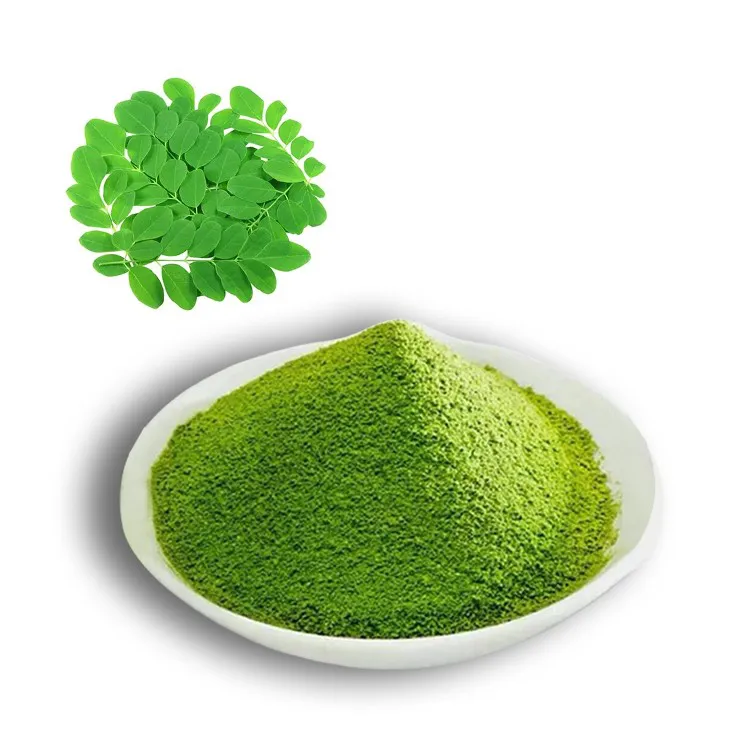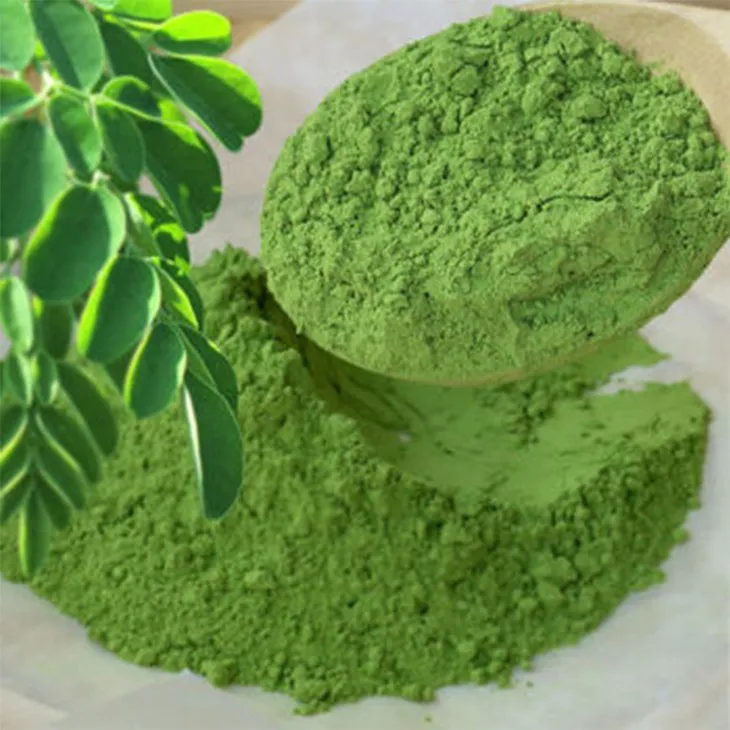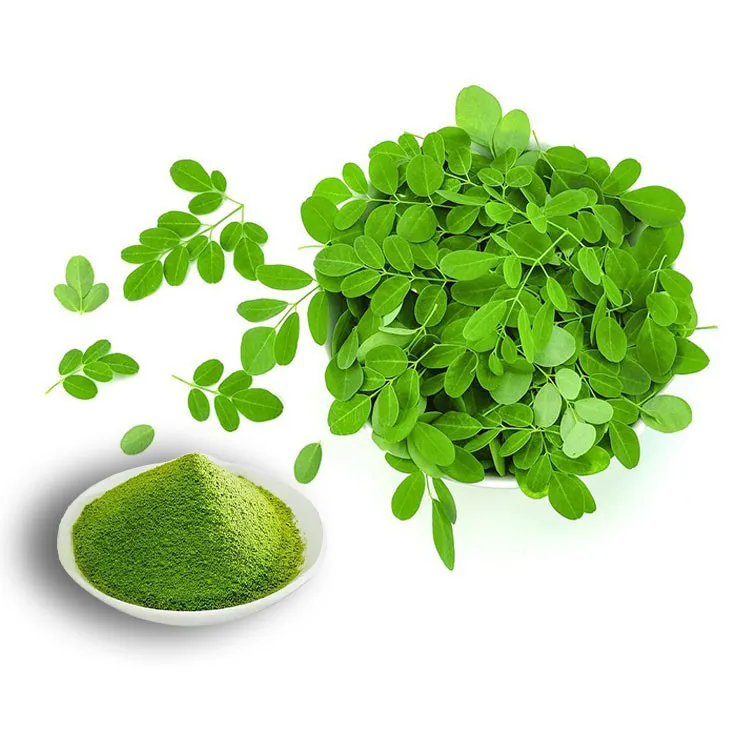- 0086-571-85302990
- sales@greenskybio.com
Optimal Bioavailability of Moringa Powder
2024-11-29

Introduction
Moringa powder, derived from the highly nutritious Moringa oleifera tree, has been recognized for its numerous health benefits. However, to fully harness these benefits, understanding the concept of bioavailability is crucial. Bioavailability refers to the proportion of a nutrient that is absorbed from the diet and is available for use or storage in the body. In the case of Moringa powder, various factors can influence how well its nutrients are absorbed and utilized by the body.

Factors Affecting Bioavailability
1. Preparation Methods
Grinding and Particle Size
- The fineness of the Moringa powder can significantly impact its bioavailability. Finely ground powder has a larger surface area exposed to digestive enzymes, which can enhance the breakdown and absorption of nutrients. Coarser particles may take longer to break down, potentially reducing the efficiency of nutrient absorption.
- For example, if the moringa leaves are not ground thoroughly, some of the nutrients may remain trapped within the cell walls of the plant material, limiting their availability for absorption.
- Some processing methods, such as excessive heat treatment, can degrade certain nutrients in moringa powder. Heat - sensitive vitamins like vitamin C and some of the bioactive compounds may be lost during high - temperature drying or cooking processes.
- On the other hand, gentle drying methods can help preserve the nutritional integrity of the powder. For instance, air - drying at low temperatures is a preferred method as it minimizes nutrient degradation compared to oven - drying at high temperatures.
2. Consumption with Specific Foods
Fat - containing Foods
- When moringa powder is consumed with foods containing fat, it can improve the bioavailability of fat - soluble vitamins (such as vitamins A, D, E, and K) and other lipid - associated nutrients present in the powder. Fat helps in the emulsification and absorption of these nutrients in the digestive tract.
- For example, adding moringa powder to a smoothie made with avocado (a source of healthy fats) can enhance the absorption of these important nutrients.
- Combining moringa powder with protein - rich foods can also have positive effects on bioavailability. Proteins can slow down the digestion process, allowing for a more prolonged and efficient absorption of nutrients from the moringa powder.
- For instance, mixing moringa powder into a yogurt - based smoothie or adding it to a meal with beans or lentils can optimize nutrient uptake.
3. Individual Health Conditions
Digestive Health
- Individuals with poor digestive health, such as those with low levels of digestive enzymes or gut disorders like irritable bowel syndrome (IBS), may have reduced bioavailability of moringa powder nutrients. Digestive enzymes play a crucial role in breaking down the complex nutrients in moringa into simpler forms that can be absorbed.
- In cases of gut inflammation, the integrity of the intestinal lining may be compromised, affecting the absorption of nutrients. People with such conditions may need to address their digestive health issues first to improve the bioavailability of moringa powder.
- Metabolic disorders like diabetes can also influence the bioavailability of moringa powder. For example, in diabetes, abnormal blood sugar levels and insulin function can affect nutrient transport across cell membranes, potentially altering the absorption and utilization of moringa's nutrients.
- Similarly, individuals with thyroid disorders may experience changes in their metabolic rate, which can impact how their bodies process and absorb the nutrients from moringa powder.

Nutrient Absorption and Utilization
Vitamins
- Moringa powder is rich in various vitamins. Vitamin A, for example, is important for vision, immune function, and cell growth. When consumed in a form with optimal bioavailability, it can be effectively absorbed and utilized by the body. The presence of fat in the diet, as mentioned earlier, can enhance the absorption of vitamin A from moringa powder.
- Vitamin C, which is also present in moringa, is involved in collagen synthesis and antioxidant defense. However, its bioavailability can be affected by processing methods. To ensure maximum absorption of vitamin C, consuming fresh - made moringa preparations or those processed with minimal heat is recommended.
- Iron is a crucial mineral in moringa powder. Iron absorption can be enhanced by consuming moringa with vitamin C - rich foods. Vitamin C helps in converting non - heme iron (the type of iron present in plant - based foods like moringa) into a more absorbable form.
- Calcium in moringa is important for bone health. The bioavailability of calcium can be influenced by factors such as the presence of oxalates in the diet. If there are high levels of oxalates from other foods consumed simultaneously with moringa, it may reduce the absorption of calcium. However, proper food combinations can help mitigate this effect.
- Moringa powder contains a significant amount of protein and all essential amino acids. The bioavailability of these proteins depends on proper digestion. Adequate stomach acid and digestive enzymes are necessary to break down the proteins into individual amino acids, which can then be absorbed and used for various functions in the body, such as muscle building and repair.
- Combining moringa with other protein sources or consuming it in a form that is easily digestible (e.g., well - ground powder) can improve the utilization of its protein content.

Maximizing Bioavailability for Maximum Health Benefits
Optimal Preparation
- To maximize the bioavailability of moringa powder, it is advisable to use a high - quality, finely ground powder. If possible, grind the moringa leaves at home using a clean and efficient grinder to ensure a fine texture.
- When it comes to drying, choose methods that preserve the nutrients, such as air - drying in a well - ventilated area or using a dehydrator at a low temperature.
- Create meals or snacks that combine moringa powder with fat - rich and protein - rich foods. For breakfast, you could add moringa powder to an omelette made with eggs (a good source of protein) and a bit of olive oil (a source of healthy fat).
- Another option is to mix moringa powder into a salad dressing made with avocado oil and vinegar, and then pour it over a salad containing proteins like chicken or beans.
- If you have digestive issues, consider taking digestive enzyme supplements or probiotics to improve your gut health. This can enhance the absorption of moringa powder nutrients.
- For those with metabolic disorders, work with a healthcare provider to manage your condition. This may include dietary adjustments and medications that can help optimize the body's ability to absorb and utilize the nutrients from moringa powder.
Conclusion
Maximizing the bioavailability of moringa powder is essential to unlock its full potential for health benefits. By understanding the factors that affect bioavailability, such as preparation methods, food combinations, and individual health conditions, we can make informed choices to ensure that the nutrients in moringa powder are effectively absorbed and utilized by our bodies. Incorporating these strategies into our daily diet can help us take full advantage of the many nutritional and health - promoting properties of this remarkable superfood.
FAQ:
Question 1: What are the common preparation methods of moringa powder to enhance bioavailability?
Some common preparation methods to enhance the bioavailability of moringa powder include mixing it with a small amount of healthy fat like coconut oil. Fat can help in the absorption of fat - soluble vitamins and other nutrients present in moringa powder. Another method is to make a smoothie with it, combining it with fruits and yogurt. The blending process can break down the particles of the powder, making it easier for the body to absorb.
Question 2: How does consuming moringa powder with certain foods affect its bioavailability?
When consumed with foods rich in vitamin C, such as citrus fruits, the bioavailability of iron in moringa powder may be increased. Vitamin C helps in the conversion of iron from its non - heme form (which is less easily absorbed) to a more absorbable form. Also, consuming moringa powder with a source of protein like nuts or seeds can enhance the overall absorption of amino acids and other nutrients present in the powder, as the body can use the protein - digestion process to better assimilate the nutrients from moringa.
Question 3: Can individual health conditions influence the bioavailability of moringa powder?
Yes, individual health conditions can play a role. For example, people with digestive disorders like celiac disease or irritable bowel syndrome may have reduced absorption of nutrients from moringa powder. In celiac disease, the damage to the small intestine can impair the normal absorption mechanisms. Similarly, those with liver or kidney problems may also have altered nutrient processing and absorption, which can affect how well the body can utilize the nutrients from moringa powder.
Question 4: What are the key nutrients in moringa powder and how is their absorption affected?
Moringa powder is rich in nutrients such as vitamins (like vitamin A, vitamin C, and various B - vitamins), minerals (iron, calcium, potassium), and proteins. The absorption of iron can be enhanced by the presence of other factors like vitamin C as mentioned before. Vitamin A absorption may be improved when consumed with a small amount of healthy fat. The proteins in moringa powder need to be broken down into amino acids for proper absorption, and this process can be influenced by factors like the presence of digestive enzymes in the gut and the overall health of the digestive system.
Question 5: Are there any specific time intervals for consuming moringa powder to optimize bioavailability?
There is no one - size - fits - all answer, but generally, consuming moringa powder on an empty stomach may lead to faster absorption in some cases. However, for those with sensitive stomachs, it may be better to consume it with a small meal. If the goal is to enhance the absorption of certain nutrients like iron, consuming it with a vitamin C - rich food or drink at the same time or shortly after can be beneficial.
Related literature
- Bioavailability of Nutrients in Moringa oleifera: A Review"
- "The Role of Moringa oleifera in Nutrition and Health: A Comprehensive Analysis"
- "Factors Affecting Nutrient Absorption from Plant - Based Powders: The Case of Moringa"
- ▶ Hesperidin
- ▶ Citrus Bioflavonoids
- ▶ Plant Extract
- ▶ lycopene
- ▶ Diosmin
- ▶ Grape seed extract
- ▶ Sea buckthorn Juice Powder
- ▶ Fruit Juice Powder
- ▶ Hops Extract
- ▶ Artichoke Extract
- ▶ Mushroom extract
- ▶ Astaxanthin
- ▶ Green Tea Extract
- ▶ Curcumin
- ▶ Horse Chestnut Extract
- ▶ Other Product
- ▶ Boswellia Serrata Extract
- ▶ Resveratrol
- ▶ Marigold Extract
- ▶ Grape Leaf Extract
- ▶ New Product
- ▶ Aminolevulinic acid
- ▶ Cranberry Extract
- ▶ Red Yeast Rice
- ▶ Red Wine Extract
-
Hericium erinaceus extract powder
2024-11-29
-
White Peony Extract
2024-11-29
-
Hawthorn Extract
2024-11-29
-
Hesperidin
2024-11-29
-
Bamboo Leaf extract
2024-11-29
-
Genistein
2024-11-29
-
Mango flavored powder
2024-11-29
-
Eucommia Ulmoides Extract
2024-11-29
-
Lycopene
2024-11-29
-
Cat Claw Extract
2024-11-29





















